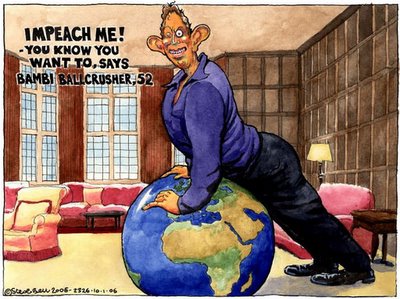General Sir Michael Rose calls for Blair to be impeached.

Michael Rose is the first army leader to speak out publicly and condemn the war. But why didn't he do this before the election, when he might have actually made some difference? Iraq is starting to fade from the public memory already, and it hasn't been helped by the Tories and Lib Dems' continuing silence over the whole matter.
Most importantly a clear justification for the war in Iraq was never sufficiently made by Tony Blair - for the intelligence he presented was always embarrassingly patchy and inconsistent. What is more, his unequivocal statement to the House of Commons that Saddam Hussein possessed weapons of mass destruction that could be used within 45 minutes was made without being properly validated - for it was decided in Washington and London to launch the invasion of Iraq early, on the basis of the flimsy evidence available. This was done without asking the UN weapons inspectors, who were actually on the ground in Iraq, to investigate this allegation. Ultimately, as the inspectors suspected and as we now all know, it turned out that there were no such weapons. Britain had been led into war on false pretences. It was a war that was to unleash untold suffering on the Iraqi people and cause grave damage to the west's prospects in the wider war against global terror.
Nevertheless, today the prime minister seeks to persuade the world that the war was justifiable because Saddam Hussein was toppled and there now exists in Iraq a slender hope of democracy. The Iraqi elections are a creditable achievement by the coalition forces. But it must be remembered that a general election was previously held in Iraq in 1956, and within two years the country had fallen under military rule. Without adequate security and the necessary democratic institutions in place, there are absolutely no long-term guarantees that democracy will endure.
Before the invasion, regime change was never cited as a reason for going to war. Indeed, Mr Blair insisted that regime change was not, nor ever could be, a reason for going to war. Had such a justification been fully debated in parliament, it is exceedingly unlikely that the necessary political support would have been forthcoming. It was the apparent need to defend ourselves against a dire threat - so vividly described by Mr Blair in the Commons - that finally won the political argument.
During the build-up to war and since, most of the electorate of this country have consistently opposed the decision to invade. People have seen their political wishes ignored for reasons now proved false. But there has been no attempt in parliament to call Mr Blair personally to account for what has transpired to be a blunder of enormous strategic significance. It should come as no surprise therefore that so many of this country's voters have turned their backs on a democratic system they feel has so little credibility and is so unresponsive.
One obvious way of re-engaging these disaffected voters would be for parliament to accept that it wrongly supported the war - but only because it believed what Mr Blair told them. Now it is clear that parliament was misled by Mr Blair, either wittingly or unwittingly, parliament should also call on him for a full explanation as to why he went to war. It is not a sufficient excuse for Mr Blair to say that he acted in good faith and that his decisions were based on the intelligence he had been given. For it is the clear responsibility of people in his position to test intelligence. No intelligence can ever be taken at face value. Indeed it is negligent so to do.
Parliament should therefore ascertain how far the prime minister did evaluate intelligence regarding WMD and how he assessed the reliability of the many sources that provided that intelligence. It should ask him what corroborating evidence there was for his specific statement about WMD - and why more use was not made of the UN inspectors on the ground in Iraq to test the validity of that statement. It should inquire just how much he discounted the mass of intelligence that came in from the Iraqi National Congress - a body that had a vested interest in removing Saddam from power. The list of possible questions is huge and would no doubt be usefully expanded during any hearings.
Mr Blair is an able barrister who should relish the opportunity to put his side of the case. No one can undo the decision to go to war. But the impeachment of Mr Blair is now something I believe must happen if we are to rekindle interest in the democratic process.
Nothing will come of this because it's far too late. It was doomed today, especially with Blair announcing his "RESPEK" agenda, the Daily Mail worrying that Brits won't be able to go to Turkey on holiday without caring about the people actually living there, and with the far more important Celebrity Big Brother mesmerising the tabloids. Let's just move on, move on, and abandon all ideology. That's all old hat, according to Blair, Cameron and Oaten. So evict all the yobs, get social entrepreneurs to make them straight and then send them on Duke of Edinburgh schemes. Introduce ID cards, ban smoking, but whatever you do, don't mention the war.
Post a Comment